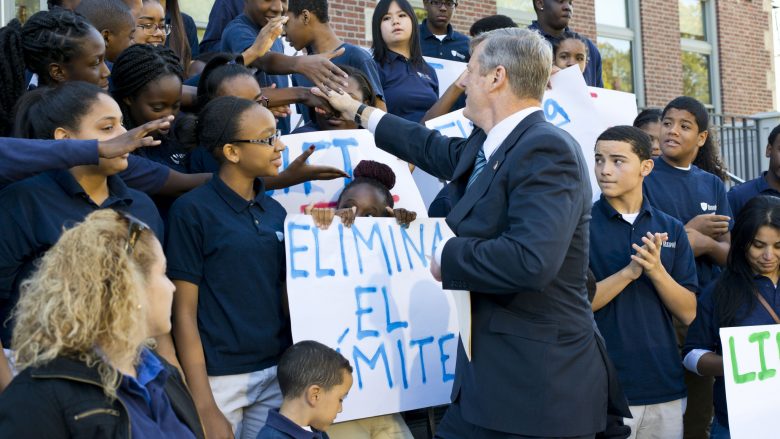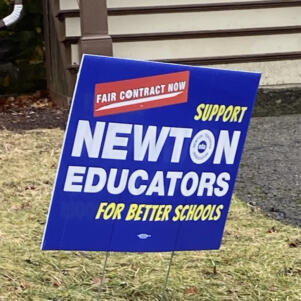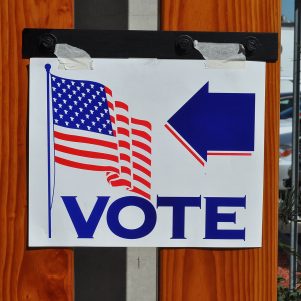Pioneer report disputes claim that charters fail special needs students
By Evan Lips | October 13, 2016, 20:15 EDT
 Massachusetts Gov. Charlie Baker greets students at Brooke Charter School in East Boston. (Joanne DeCaro/Office of Governor Charlie Baker)
Massachusetts Gov. Charlie Baker greets students at Brooke Charter School in East Boston. (Joanne DeCaro/Office of Governor Charlie Baker) BOSTON — A Pioneer Institute report is countering claims by the “No on Question 2” crowd that charter schools do not adequately serve special needs students.
The Hub-based think tank that specializes in free market advocacy released its report Thursday morning, which quickly raised put opponents of the ballot question on the defensive:
Using flat percentages across the state, yes, they have roughly the same percentages of kids with IEPs. But you have to look at the data. https://t.co/hDCxH9KVWS
— Googie Baba (@GoogieBaba) October 13, 2016
The ballot question asks voters to determine whether the state will will lift the cap on the number of new charters permitted to commence operations.
Pioneer’s study cites a state law passed in 2010 requiring all charters to draft and implement plans aimed at recruiting and retaining special needs students and English language learners. The report calls into question major rallying cry for cap supporters, namely, that charters fail special needs students.
The study also notes that charter enrollment for special needs students leaped from a little more than 500 students in 2009 to more than 1,500 students in 2016.
Charter School Special-Needs Students Enrollment Rising, Outcomes Improving https://t.co/qWayRfOh22 #edreform #edchat #yeson2ma #noon2 pic.twitter.com/FZ8FE8KcUh
— Pioneer Institute (@PioneerBoston) October 13, 2016
Opponents of the cap-lifting question have claimed that charters frequently turn away or fail to properly serve such students:
More HYPE & lies to mask real inequities in services. Charters DO NOT Provide an education for ALL children! Vote #NoOn2 #keepthecap #TBATs
— Lea M. Benson M.Ed. (@bledwine) October 8, 2016
The report states that while the special education enrollment rate at Boston Public Schools is currently hovering at around 20 percent, Boston-based charter schools have 16 percent of their students participating in individualized education programs.
In a statement provided to the Boston Herald, the No on 2 campaign, Save Our Public Schools, responded with a claim that charters “still suspend those students at highly disproportionate rates and fail to provide the critical services that students with severe disabilities need.”
The report’s release occurred on the same day that the New York Times editorial board admonished NAACP leaders for advocating for a national moratorium on charter school expansion.
“For many parents and students, a charter school is the only route to a superior education,” the editorial stated. “In advocating a blanket moratorium on charters, the N.A.A.C.P. would fail to acknowledge what’s happening to children who need and deserve a way out of the broken schools to which they have been relegated.”
If voters approve of the initiative on Nov. 8, the Massachusetts will be required to license up to 12 new charter schools annually.
NBPElection











